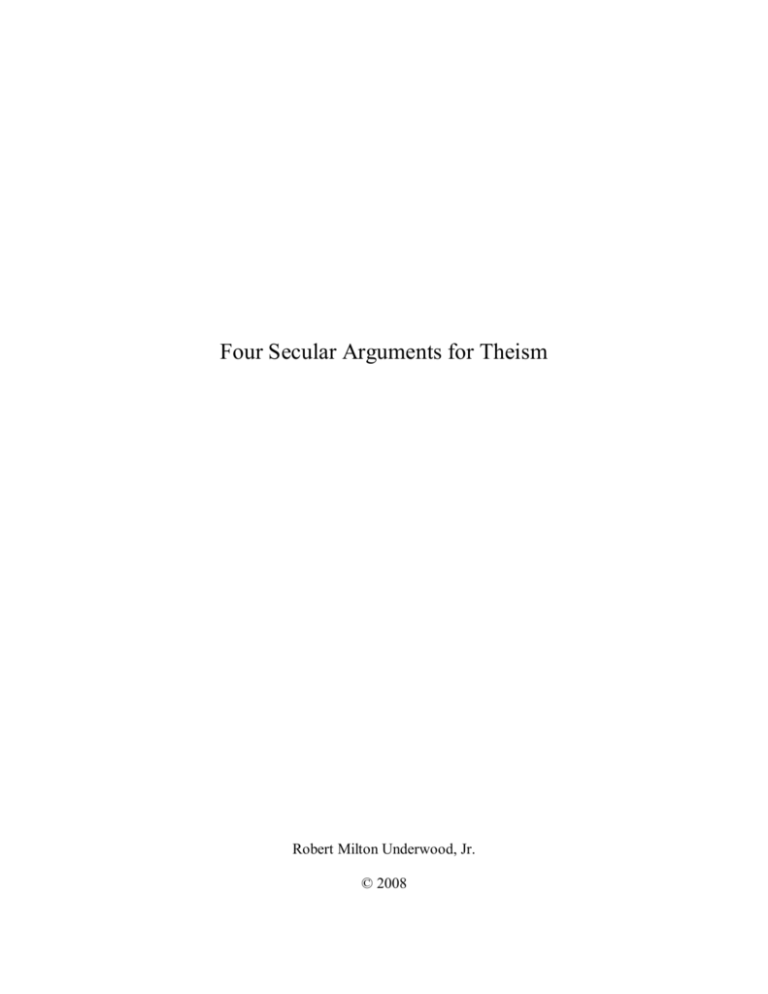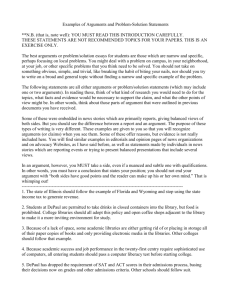
Four Secular Arguments for Theism
Robert Milton Underwood, Jr.
© 2008
Underwood 1
Four Secular Arguments for Theism
Questions about the existence of God have engaged humans since antiquity. Opinions
have ranged from complete and willing acceptance of the notion of a higher power to outright
rejection. Richard Swinburne, a professor at the University of Oxford, rhetorically asked why
anyone should believe that there is a God. His answer in the broadest context was that it made
sense that there was a God to explain why we have the world that we do, including the
development of highly cognitive animals and the realization of scientific laws. In his essay, “The
Justification of Theism,” he presents four major types of arguments to support his assertion that
God does exist.
The first type of argument that Swinburne presents is that of induction. An inductive
argument is one in which premises provide justification for supporting the probable1 truth of the
conclusion. With an inductive argument, the author of the contention does not think that the truth
of the premises definitively establishes the veracity of the conclusion, but nonetheless believes
that their plausibility provides good reason to believe that the conclusion is true. Inductive
arguments can appeal to any consideration that might be thought relevant to the probability of
the truth of the conclusion. Inductive arguments, therefore, can take very wide ranging forms,
including arguments pertaining to statistical data, generalizations from prior experiences, appeals
to authority, and relationships of a causal nature.
Swinburne believes that each little clue leading to the existence of God is considered a bit
of evidence, and all evidence mounts up cumulatively making the hypothesis believable. To be
believable, he wrote that arguments must satisfy three different criterions. First, what is observed
must not be very likely to occur in the normal course of events. Secondly, what is observed is
much more likely to be expected if the hypothesis were true. Thirdly, the hypothesis should not
1
In contrast, a deductive argument is one in which premises provide justification for guaranteeing the conclusion.
Underwood 2
be complex; simplicity is valued in that it allows focus on a viable argument. The satisfaction of
these collective criteria is sufficient for making an inductive argument worthy of belief.
The second main category of arguments for the existence of God that Swinburne
describes is that from the existence and order of the universe. There are natural laws for
describing various parts of the universe, but there is no law which explains those other natural
laws. Science can never fully explain the universe since it requires the scientific method, and
some things like the Big Bang theory are simply not provable by some ultimate and
comprehensive natural law. The concept of God would help explain why there are natural laws in
the first place, and would help us take into account that despite an apparent orderly universe, we
don’t necessarily know about all natural laws that may exist.
Instead of a scientific explanation, a personal explanation may be proffered. Words are
used as tools between people to facilitate communication (Nagel 44). A personal explanation is
the type used to explain many ordinary events, such as explaining to a friend that the reason that
the car is so clean is that it just came back from the car wash and had a detailed cleaning. That
type of explanation doesn’t require a scientific explanation, yet is entirely valid in its purpose--to inform. Each personal view is valid in its own right, since it is, by definition, personal.
Excluding delusional individuals, a personal view might be just the way to explain God since
each individual can react differently to God from a personal viewpoint.
Natural laws of the universe help explain the matter in the universe, and scientists can
make observations of natural laws of phenomenon that are consistent over distances of countless
light years. Millions of years pass by over time, but the laws of nature still maintain their
functional properties. While scientists can understand many natural laws through theories based
on observable and measurable phenomenon, they can’t and won’t have a scientific explanation
Underwood 3
for the universe that can be proven in a strict scientific sense. So, according to Swinburne, there
must either be a personal explanation of the universe or none at all.
Swinburne also states that a hypothesis of God is one of simplicity. In other words, it is
simple to describe God as omnipotent, omniscient, and unlimited in freedom. It is more difficult
to describe God as an entity with limited powers, because then the discussion would require
explanations as to why there are limitations, and of what type(s) are those limitations. It makes
sense that there is order in the universe, and that there are regularly observed phenomenon, and it
is easier to explain the universe if God is the causal factor. Without the God part of the equation,
the universe would be much more difficult to explain.
The third type of argument for God is the argument from the evolution of animals and
humans. It is essentially an argument based on the adaptability of life. Charles Darwin offered
his theory of evolution by natural selection to explain how organisms evolved over millions of
years. Adaptation allowed species to improve upon certain qualities over time. Swinburne agrees
with Darwin’s theory, but recognizes two matters that are beyond its scope. First of all, certain
evolutionary laws are in place that describe how organisms evolve with regards to genetics and
environment, but there is no explanation as to how these laws became the laws of nature in the
first place. It is more sensible for there to be an intelligence of some sort that is behind these
laws.
The second point beyond the scope of Darwinian theory is that it explains only the
physicality of life. It does not explain the ability of humans to have thoughts, beliefs, feelings
and to make decisions based on the availability of often numerous choices. We do have chemical
events happening in our brains that are a part of the process of thinking, but Swinburne
distinguishes these from mental happenings--- those that are beyond the function of the chemical
Underwood 4
processes in the brain. The brain functions chemically, but there is no explanation to describe the
function of the mind. God, as mind, works perfectly as an explanation in that it takes us beyond
brain chemistry to describe a noncorporeal state. So Darwin’s research might explain why some
animals evolve, and why others go extinct, but it will not be able to explain all of the unknowns
beyond physicality.
The fourth argument presented by Swinburne for theism is that based on miracles and
religious experience. Miracles are not simply events that are not explainable by science. Many
unusual things eventually are explained by science. Rather, miracles are events that seem to
violate laws of nature. They beg an explanation beyond what science can offer; theism most
certainly will accommodate.
Individual religious experiences are, by definition, subjective in nature. It is wondered
how there can be so many different religious experiences without an explanation that unifies
them all. Many individuals have felt the presence of God throughout their lives on one or on
many occasions. It manifests as a feeling of a higher power that is beyond us. Since many others
also feel this on occasion, there are groupings (viz., churches) that represent communities of
those who are so affected. Experiences are shared in such communities and increasing credulity
is experienced by all believers as a result. An individual view is legitimized when others have
experienced similar views. An argument for theism is therefore a sufficient argument for belief
in God. No one is saying that just because the masses believe in something that they are therefore
correct. Many beliefs that the majority holds dear can easily be shown to be fallacious. However,
sharing religious experiences using reasonable descriptions of such is enough to give credence to
the belief in God.
Underwood 5
Not every single unexplainable phenomenon should be rushed to explanation as being
attributable to God. Many things are simply unknowns in the field of science. They may be
eventually explained by science. Other things, especially those beyond the physical, will never
be able to be explained by science. But a cumulative acquisition of bits of evidence can explain
the underlying presence of God, that which is behind, under, around, within, without and through
all things. According to Swinburne (Burr and Goldinger 125), we should believe in God unless
there is contradictory evidence. It answers so much, especially a case for the existence of an
intelligence and order beyond us that may be satisfactorily argued using all four of Swinburne’s
major types of arguments.
The idea of God (is) the idea that can explain everything else … (but not) itself” (Nagel
99). One potential problem that critics may have with faith-based beliefs in God can be
overcome with the removal of anthropomorphic qualities of God. It should not be assumed that
God would behave as a human would, and would punish and reward people as a human would.
Traditional references to God in the male gender can be confusing and decidedly misleading.
The removal of gender and other human characteristics from the concept of God might actually
make that concept more acceptable. God can be described as omniscient and omnipotent, but we
are obviously not in possession of those qualities and therefore cannot comprehend what having
them entails. We are finite beings, and we cannot think that we could understand an all-knowing
and all-powerful intelligence. But proof of the existence of God in the form of the scientific
method is not necessary. W. T. Stace2 wrote, “To ask for a proof of the existence of God is on a
par with asking for a proof of the existence of beauty. If God does not lie at the end of any
2
Walter Terrance Stace was an empiricist, and a philosophy professor. James Ward Smith, a colleague, has said that
Stace’s basic position was that “empiricism does not require the confinement of belief to propositions that are in any
strict sense demonstrable” (Leitch).
Underwood 6
telescope, neither does he lie at the end of any syllogism…” (Leitch). By carefully considering
all four of Swinburne’s arguments, we have the most pragmatic secular case for the existence of
God. Individuals can then decide for themselves if they want to add a religious component to
enhance their personal understanding.
Underwood 7
Works Cited
Burr, John R. and Milton Goldinger. Philosophy and Contemporary Issues. Upper Saddle River,
NJ: Pearson Prentice Hall, 2004. 103-175.
Deductive and Inductive Arguments. The Internet Encyclopedia of Philosophy. 2006 <http://
www.iep.utm.edu/d/ded-ind.htm>.
Leitch, Alexander. A Princeton Companion. Princeton: Princeton University Press, 1978 <
http://etcweb.princeton.edu/CampusWWW/Companion/stace_walter.html>.
Nagel, Thomas. What Does It All Mean?. New York: Oxford University Press, 1987. 44, 49.







